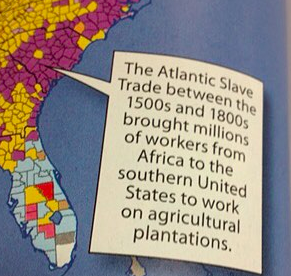Why Texas May Decide What Your Child Learns

History, it’s said, is written by the winners — they’re the ones who are still around to do the research, write the magazine articles, author the books, and curate the encyclopedias. While we hope that whatever the winners write is fair and accurate, that’s not always the case. There’s always a likelihood that the authors’ biases will emerge and the risk that those biases will obscure the truth. For that reason, we’re generally very skeptical of relying on one canonical source for our investigations into the past — at least as adults. But as children, the opposite is often true. Schools issue history books to kids in the form of textbooks and use those as the basis of instruction.
But who decides what goes into the history textbooks? Surprisingly, a lot of it boils down to fifteen people in Texas.
Texas is the 2nd most populous state in the United States, behind only California. Each year, Texas purchases about 50 million new textbooks. But while California and the other 48 non-Texas states empower local school districts to determine which books to buy, the Texas Board of Education makes centralized decisions as to the fitness and appropriateness of textbooks. As PBS explained, “all [Texas] public schools get money to purchase specific textbooks based on the state board’s decision” and can’t buy texts not on the list. As a result, the Texas Board of Education has an exceptional amount of leverage over textbook publishers.
Unfortunately, those standards aren’t developed by career academics with a deep expertise in education or, for that matter, the topic of the textbooks in question. Rather, politics is the driving force behind the evaluations. In recent years, controversy has become commonplace. For example, since 2010, the state explicitly requires that students “identify major intellectual, philosophical, political, and religious traditions that informed the American founding, including Judeo-Christian (especially biblical law)” and “identify the individuals whose principles of laws and government institutions informed the American founding documents, including those of Moses.” And while the role of Judeo-Christian religion is explicitly emphasized, the role of slavery in the pre-Civil War South (and as a cause for the war) has been downplayed. This led to an insertion in one text book, below, which resulted in public outcry recently — because slaves were highlighted as “workers”:

(The publisher of the book, McGraw-Hill, responded to the public’s dissatisfaction by admitting that they did a bad job there and announced they’d revise the copy for current digital and future print texts.)
And don’t think that because you’re not in Texas, you’re immune from these books. As the National Education Association noted, Texas’s decisions could spill over to other states: “The standards will guide textbook purchases and classroom instruction over the next decade — and maybe not just in Texas. National publishers usually cater to its demands because the [Texas] school board is probably the most influential in the country.” The New York Review of Books further explained how this influence could very easily mean that the books requested by Texas made their way into other states as well:
David Anderson, who once sold textbooks in the state, said that if a book made the list, even a fairly mediocre salesperson could count on doing pretty well. The books on the Texas list were likely to be mass-produced by the publisher in anticipation of those sales, so other states liked to buy them and take advantage of the economies of scale.
The good news, though, is that despite Texas’s deep pockets, its influence on the textbooks over non-Texans may be waning. A move to digital textbooks and efficiencies in publishing paper-and-ink versions have made it increasingly easier for publishers to adjust the copy for those outside of Texas, often without more than a marginal additional cost.
 Bonus Fact: Bill Watterson, the creator of comic strip Calvin and Hobbes, almost never licenses his characters for commercial use. One exception, though, came in 1993, when a special education teacher wrote to him to tell him that her students found Watterson’s characters engaging and asked him to license a textbook for her and others to use. He agreed, “Teaching with Calvin and Hobbes” entered a limited print run. Because the print run was so small and because Watterson doesn’t often authorize licensed product, the book is now very expensive, even for a textbook. As of this writing, if you want to buy one on Amazon, you can — for $1,600, used.
Bonus Fact: Bill Watterson, the creator of comic strip Calvin and Hobbes, almost never licenses his characters for commercial use. One exception, though, came in 1993, when a special education teacher wrote to him to tell him that her students found Watterson’s characters engaging and asked him to license a textbook for her and others to use. He agreed, “Teaching with Calvin and Hobbes” entered a limited print run. Because the print run was so small and because Watterson doesn’t often authorize licensed product, the book is now very expensive, even for a textbook. As of this writing, if you want to buy one on Amazon, you can — for $1,600, used.
From the Archives: Brown Bear, Banned Bear: When the Texas Board of Ed (accidentally) banned a popular children’s book.
Take the Quiz: Can you name the 300 most populous cities in Texas?
Related: “Teaching with Calvin and Hobbes.” Four reviews, each of five stars (not that would-be purchasers are looking to read the comic book; they just want to collect it).
